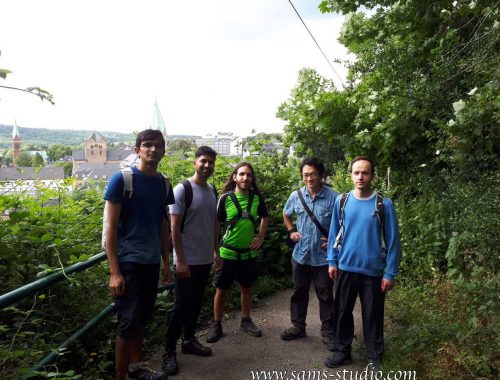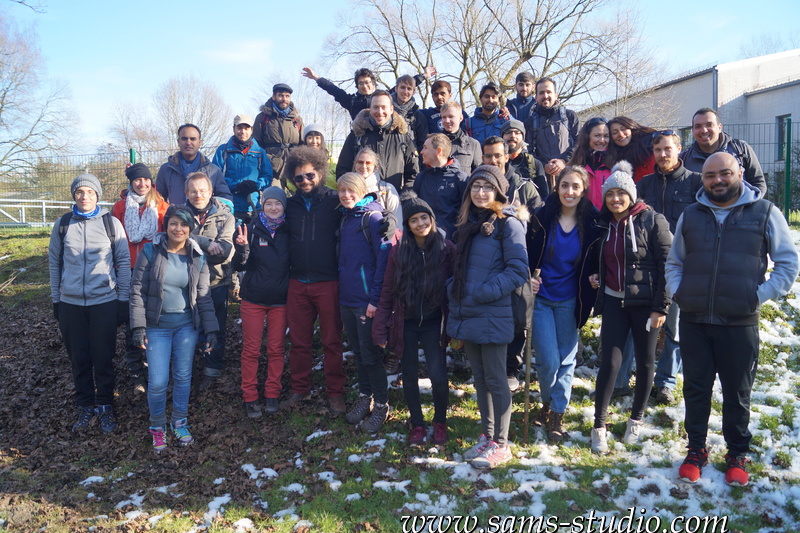
Hiking at Aprath!
50 times. Yes, 50 times. That’s the number of hikes that I organized since I arrived here in Düsseldorf. If I look back now and think of what it was like to come so far, I can hardly believe that my capricious idea of going hiking every Sunday turned into such a success in the meantime. Stefan told me it was the highlight of the year. Vitali met his girlfriend on a hike, so did Nicola, too (although I don’t know their girlfriends so well). On this occasion, I’ll write about living abroad as a foreigner coming from a very different culture below. But before doing so, let’s see what the hike of today was like.
I must have talked about my flatmate Alfredo who went to the Caribbean some time ago. During his absence, his room is essentially empty. So he decided to sublet his room. Now I’m having a temporary German flatmate, Axel, who joined us on the hike this week.
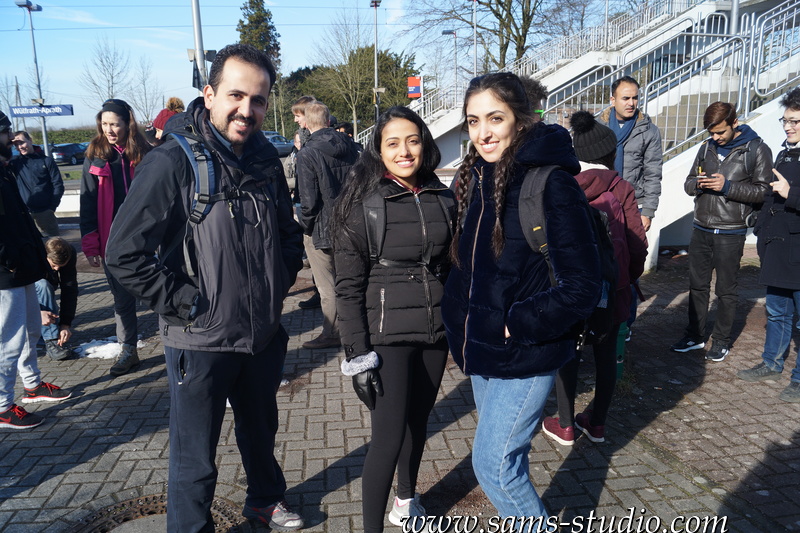
In strong contrast to last week, we had a quite substantial number of people in front of the central station today. But it was quite tight regarding the number of people who had a ticket. We just got it right.
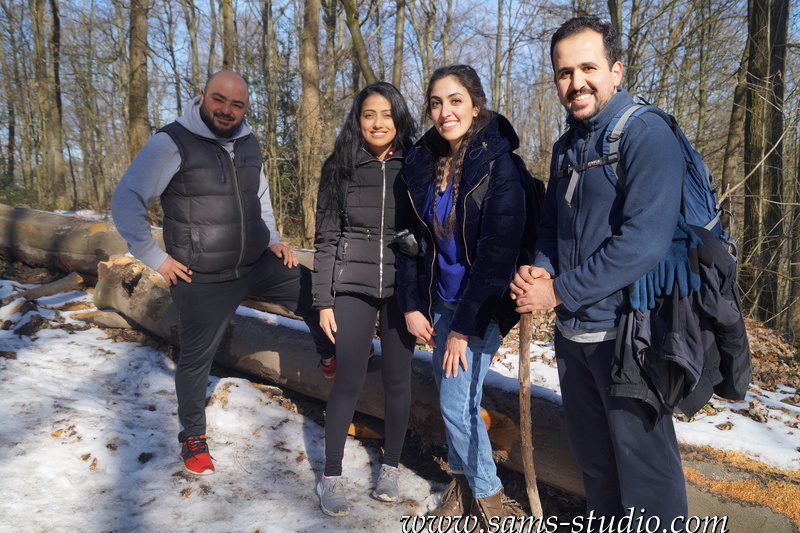
Today’s hike, around Aprath, was a kind of hike that I made up just in order to have something that can be done in winter. I would certainly not do this hike in summer, but anyway right now we can be happy to be able to go out at the first place. So a satisfactory hike, not much more than that.
It’s been quite some time that it’s sunny here in this region. So I thought I wouldn’t need my hiking shoes this time. Quickly I realized that I was quite wrong: there was still snow lying here. Aprath right in the north of Wuppertal, it has a fairly distinct climate. So it’s actually not so surprising that it was different. I just didn’t expect anything like this. And it was quite slippery. Good that I didn’t fall down (although some of us did).
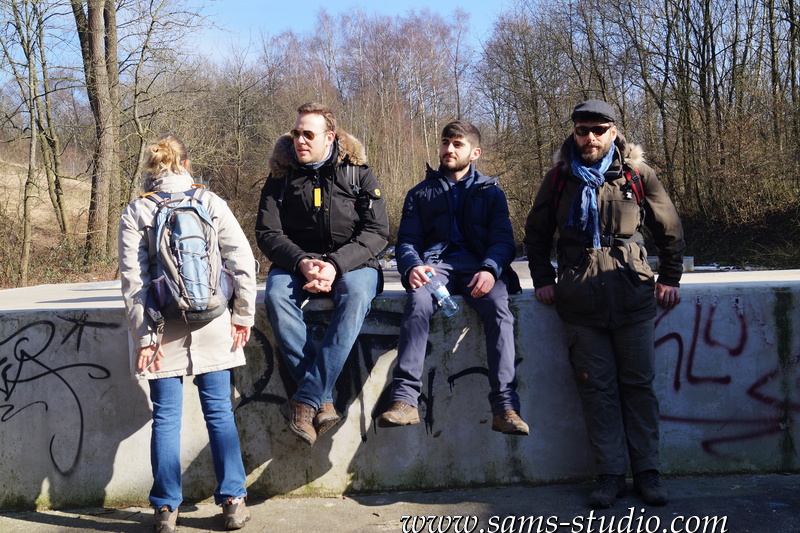
I was planning to have a break at a tennis court on the way, which on the map said had a restaurant. Whenever I see something like this, I should probably also make sure that it’s open, because it rarely is. And appropriately enough, it was closed, just because it was closed since last Monday for some time. Still, the place itself was open and we could use the toilet. And it had a nice playground right next to it. We had a break there. Nice to see that we can have a proper break outside again. Even though there was still some snow, it was not that cold outside.
The way back to the train station was just as complicated as the first part. Quite muddy at some points. But we had a better mixture of forest and fields. And sunny. That’s when it becomes nice to make photos 🙂

There’s this restaurant called Aprath mill at the end of the hike, which has rather horrible references on Google. Since we were just staying for a short while, I thought anything would be fine. As we found out, the staff were really friendly.
So, the 50th time. About a year went on and we came so far now. I have no idea how many people I met over this year. All of us started as strangers. We all got connected, over the hikes.
About three years ago in this period of time, I hosted a schoolgirl from Japan at my place, who was staying in Germany for an exchange year. The very reason that I knew her was because I gave a German course to a group of Japanese exchange students about half a year earlier, and she was one of my students. On this occasion, I wanted to know what she found difficult in her life in Germany.
“Nothing in particular, but I don’t know how to behave with those who want to help me.”
That corresponds to what I felt when I came to Germany. It is a feeling that is difficult to describe. And certainly it is difficult to understand what it feels like, especially because it does not feel the same within the relatively similar culture zone, like within Europe. In short, it is like this: coming from Japan, I had great difficulties entering the German society, but just as difficult as this was, it was difficult to know how to behave with those who wanted to help me.
Maybe it is important to mention one thing here: if you live in Asia, you might be having the impression that the Asians living here are fully integrated in the European society. At least in the news articles from Japan I see often Japanese people reporting their experience in Europe, that makes the impression that they are fully enjoying their lives here. That’s not exactly true. They usually continue their Asian lives here in Europe and they form a small community with the people of the same country of origin. With 5,000 Japanese living here in Düsseldorf, it is extremely rare to see a German who knows Japanese people outside their professional relationships. It just shows how difficult integration is.
My first stay in Germany was in Bamberg, Bavaria. Now I cannot tell you how much effort had to be done by the people around me at that time to sustain my daily life. But it was much later that I was truly integrated in the German society. The very person who integrated me, Eduard, was indeed not at all a person who would “help” foreigners. I wouldn’t be surprised if he had said “helping refugees is nonsense”. However, Eduard was indeed the person who integrated numerous foreigners into the German society, just because he did not change his behaviour according to the person he was with. And in the end, he was doing exactly what a lot of aid workers and helpers wish they were doing.
“Helping refugees” is certainly a great thing, and I don’t doubt many refugees need it. But for the ones who had normal lives in their countries of origin, living in a different society merely requires subtle discoveries in the daily life which allow them to adjust themselves slightly. And for this, they need people who reflect the pure local society by behaving naturally.
After all, we are living in a world in which people from different countries are anyway connected better and better. And the variety of options in the daily life is getting larger and larger. In such a world, it is just stupid to place the country of origin before the variation of personalities.
With all this in mind, what was crucial to me was this: what we need is not a place for the locals to get in touch with foreigners, but a place for the foreigners to have the chance to be integrated in the local society. And throughout the 50 hikes we’ve done so far, we’ve seen new connections of people arising. Locals meeting expats. Couples being formed etc. Now, looking back at what it was like a year ago, it is difficult to believe that all these people did not know each other. The effect might be tiny, but at least I’m doing what people provided for me before, and I’m doing what I wished I’d be doing.
There is this one article from spiegel.de, where you can test your German to know which area your dialect comes from. It was very popular some years ago and known to be quite precise. According to my result, my German dialect comes from Northeim, which is a small village of merely 30,000 people that nobody really ever heard of. Everyone around me looked puzzled, mainly because they did not know this village and they did not see any connection with me. I did, because this is the very city in which Eduard grew up.
Today’s society is certainly built upon yesterday’s society. The legacy lives on. 50 times has been achieved. I’m looking forward to the next 50 times and more.
You May Also Like
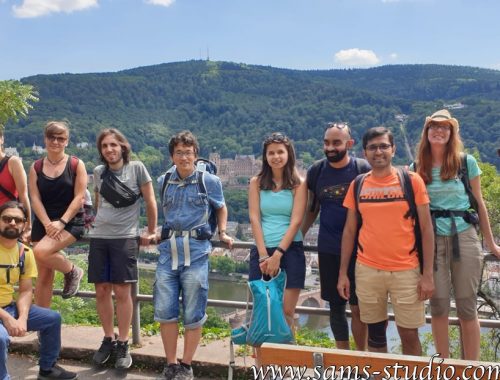
Weekend trip to Heidelberg!
July 19, 2020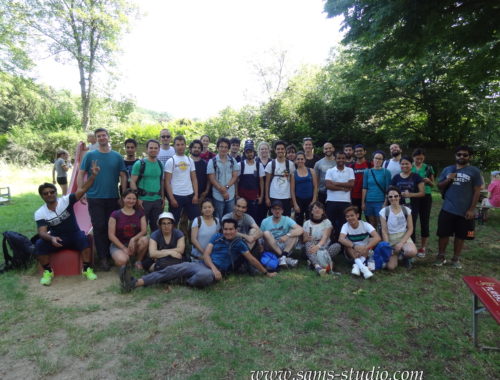
Hiking from Wuppertal to Schaberg!
June 23, 2019